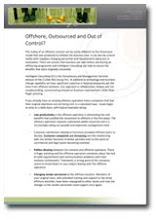It’s the first time that employment has fallen since 2013. In March – May 2015 there were 30.98 million people in work; 67,000 fewer than in the period December 2014 to February 2015. This leaves 1.85 million unemployed people across the UK. This doesn’t necessarily mean that the upward trend in employment we have come to expect is on its way out, but it seems it can no longer be taken for granted.
However, as 74% of UK employers plan to recruit more permanent staff over the next three months, hopefully this dip in the economy in the last two months is a temporary glitch. In fact, Markit’s recent research shows that ‘new product developments, investments in additional capacity and expansion into new markets’ will boost growing support for businesses over the next year. In the private sector at least, employment is expected to grow as more people are hired to tackle rising workloads.
Amidst growing concerns over the UK’s EU referendum and government spending cuts, there is one particular obstacle to employment growth which is proving to be a persistent thorn in our sides. The skills shortage is one of the most urgent problems in the labour market today, yet is perhaps the least ‘quick-fixable’, preventing any significant hiring until training and development catches up. At the moment, a great many businesses are operating at a very high volume, yet 96% have declared that they have ‘no’ or only ‘a little’ surplus capacity to manage any further increase in demand. For the REC’s Chief Executive, Kevin Green, “it’s concerning that instead of meeting this challenge the government is making it harder for employers to bring in the people they need from overseas with the proposed changes to Tier 2 visas”.
But beyond recruiting more, there needs to be a focus on developing staff internally. Three-quarters of employers, according to Personnel Today, worry that there is a skills gap between their current employees’ competencies and what is needed for them to succeed in the future. Not only does L&D raise and adapt an employee’s skills, but it also acts as a strong retainer. It encourages employee loyalty because it shows an employee that they are care about their learning and shows they want to upskill them to take on more responsibility and broaden their scope and capabilities. We must remember that the multitude of ‘underskilled’ workers are, most likely, more than happy to learn and to become more valuable to their organisation. We all want a more stable labour market with minimal unemployment, and if we don’t have the skills to make it happen yet, we certainly have the ability to grow those skills from our current capabilities.







No comments:
Post a Comment